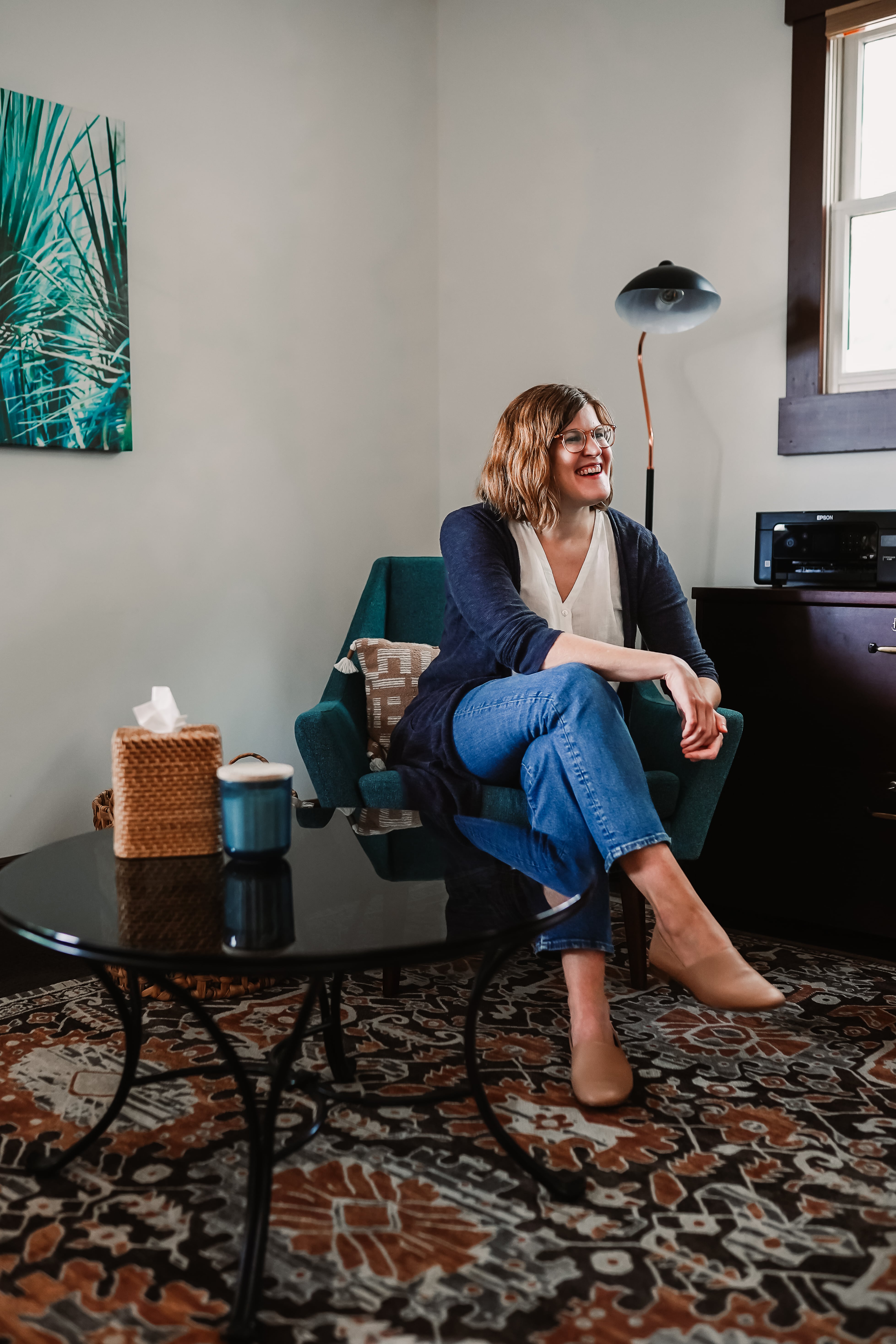
What conditions do you treat?
I am trained as a generalist, which means that I am able to work
with a wide variety of mental health needs. I have experience in
treating anxiety, ADHD, depression, anger, alcohol and drug use,
grief, trauma exposure and PTSD, and adjustment to life
transitions.
My passion is in working with Millennial and Gen Z men and women
who experience anxiety, imposter syndrome, perfectionism, people
pleasing tendencies, and self-doubt. My clients are often kind
and talented young professionals who have trouble showing up for
themselves and building confidence.

What does therapy look like?
Initially your therapist will have an intake appointment with
you. This is an opportunity to fully understand your background
and history, including what is bringing you to treatment now.
During the intake and the first few appointments, we will talk
in depth about your specific needs and develop a plan together
to improve your mental health.
Therapy generally occurs weekly or every other week. In
appointments, we will talk about how you are doing, build
skills, process your concerns, and actively review how treatment
is going.
Therapy occurs collaboratively and with your active input and
participation. It is a space for you to voice your needs,
advocate for yourself, and learn the skills to transform your
life outside of the therapy room.

How do you approach therapy with clients?
I am an
integrative therapist, and
incorporate CBT, DBT, ACT, mindfulness, attachment theory, and an
understanding of family and larger social systems into my
therapeutic approach.
I think the therapy process should be individualized for each
client. During our initial sessions together, I'm learning about
you and we're collaboratively developing a plan for your
treatment. This means incorporating my knowledge of
evidence-based therapies, like CBT, DBT, & ACT with your
specific concerns and problems you're bringing to therapy. I
view the therapeutic relationship as highly collaborative and
value your input and perspective on what works best for you.

How can I tell if we're a good fit?
The relationship that you have with a therapist is one of the
biggest factors in your healing. You should work with a provider
that you feel comfortable with and confident that they can meet
your unique needs.
I offer a complimentary 15-minute phone consultation to all new
clients. This is an opportunity to get to know one another,
discuss your specific treatment needs, and for you to ask any
questions you may have for me.

What if I don't have a mental health diagnosis?
Therapy can be helpful for anyone who is looking to better their
life and improve how they deal with stress. Many people come to
therapy when they're adjusting to life changes, feeling
dissatisfied with their job, or having problems in a
relationship. Being able to talk to someone outside of your
social group can help to get a third party perspective and
provide additional support.
Therapy can help you set boundaries, become more assertive, and
build confidence to make changes. Therapy can also give you a
better understanding of yourself, how you operate, and what you
value.

Can you see me where I'm located?
I'm physically located in Indianapolis, IN and offer in-person
appointments to people based locally. I'm a licensed
psychologist in Indiana, Massachusetts, and New York and can
virtually see clients who are physically located in these
states.
In addition, I am authorized through
Psypact
to provide telehealth care to clients in any participating
Psypact states. Psypact allows for telehealth care in 40 states
and DC. Please visit the link to see if your state participates!
What are your business hours?
My hours of operation are Monday - Thursday from 9am - 5pm EST.

I'm interested, what happens next?
I'm so glad we feel like a good fit! The first step is to schedule a free consultation.
After our initial consultation, we will schedule an intake
appointment together. I will also send you an email link to
register for my secure electronic medical record (EMR). After
registering for the EMR, I will send you documents to complete
before our first appointment. We will review these documents
together in our first visit.
What are your fees?
The intake session is $300 and subsequent appointments are $275 per 50-minute hour. More information about the structure of the intake and therapy sessions can be found on the services and fees page.
Do you offer reduced rate sessions?
If it seems like we'd be a great fit, but you're worried about the cost, please reach out to me. I offer a limited number of sliding scale slots and am happy to talk about this with you during our initial consultation call.

How does billing work?
I am an out of network provider, which means that I am not
paneled with any insurance companies. I can provide you with a
superbill which you may submit to your insurance for potential
reimbursement.
Before we schedule our first appointment, I advise calling your
insurance and asking them about coverage for out of network
providers, including:
- Do I have out of network coverage in my plan?
- What percentage or amount do they reimburse for out of network providers?
- Do I have to meet a deductible before getting reimbursed by insurance? If so, how high is my deductible?

What are the benefits of seeing an out-of-network provider?
Working with an out-of-network provider allows you to keep your
medical and mental health information confidential. It allows
you to dictate the treatment that you need with your therapist,
including the frequency of appointments, the type of care
received, and the length of your appointments, without needing
to let insurance make these decisions for you.
Many people choose to see out-of-network providers when they
offer highly specialized training and expertise that in-network
providers do not offer. In addition, sometimes an out-of-network
provider feels like "the best fit" to work with. As an
out-of-network provider, I limit the number of clients I see,
and am able to provide responsive, often same-day care. This can
allow for a more personalized and quality experience for you as
a client.

What is the difference between a psychologist and a
psychiatrist?
Can you prescribe me medication?
Psychologists attend graduate school at the doctoral level and
receive specialized training in clinical psychology. This
includes in depth coursework on best therapy practices and
assessing mental health conditions, as well as multiple years of
on-the-job training in therapy, assessment, and the nuts and
bolts of being a therapist. Training requires a year-long
psychology internship, where psychologist trainees are working
full-time in a job.
Psychiatrists attend medical school and specialize in psychiatry
during their medical residency. They are able to prescribe
medication, while psychologists generally do not. Often,
psychologists and psychiatrists work together to provide care
for clients that includes both medication and therapy.

What if I need help now?
I review and respond to all calls and emails received within
24-48 hours. I am not an emergency contact.
If you are having a mental health emergency, please call 911 or
visit your local emergency room. You can also text HOME to
741741 (Crisis Text Line) or call 988 to speak with someone live
(Suicide Prevention Lifeline)
If you live in Massachusetts you can call
1-800-981-4357 (Boston area) or
1-877-382-1609 to speak with the
Mobile Crisis Team. This may be an alternative to going to the emergency room.
If you live in Indiana, you can call
317-621-5700 (option #1) to speak
with
Community Hospital's 24-hour crisis line.